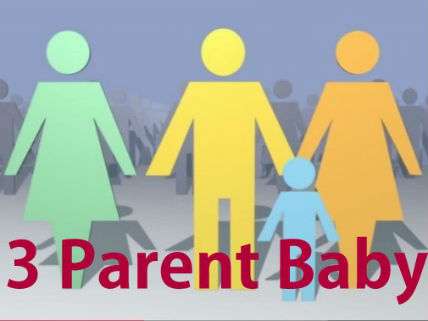First 'Three Parent' Baby Born in Mexico
Due to FDA ban parents must resort to treatments abroad in order to have a healthy baby

Great news! American fertility specialists replaced defective mitochondria in a embryo resulting in the birth of a healthy baby boy five months ago. The bad news is that due to a fifteen year Food and Drug Administration ban, the procedure had to be performed in Mexico.
Mitochondria are the energy producing organelles in each of our cells which carry their own small genomes and are passed down to children from their mothers. Broken mitochondrial genes cause a wide variety of illnesses from which about 1 in 4,000 people suffer (that is about the same rate as cystic fibrosis among European-descended Americans). In this specific case, the mother carries a mitochondrial mutation associated with Leigh's Disease that causes brain lesions and which killed her first two children. The cure was achieved, as the New Scientist explains:
[New Hope Fertility Center specialist John] Zhang … removed the nucleus from one of the mother's eggs and inserted it into a donor egg that had had its own nucleus removed. The resulting egg – with nuclear DNA from the mother and mitochondrial DNA from a donor – was then fertilised with the father's sperm.
Zhang's team used this approach to create five embryos, only one of which developed normally. This embryo was implanted in the mother and the child was born nine months later.
Hearty congratulations are in order to the parents, the baby, and the team that made it possible! Well, not everyone actually agrees with that sentiment. CNN reports:
"It's unfortunate to have people decide they're just going to quite willingly engage in this kind of reproductive tourism -- to go outside of a system that is in place to create the safest, most scientifically reproducible way forward," said Lori P. Knowles, assistant professor, adjunct, at the University of Alberta School of Public Health. "That's the precedent then, that if you think you can do it, then let's just hop the border and see what happens, hope for the best."
Cannot bioethicists hear themselves! Having endured four miscarriages and two dead children, this mother had already seen "what happens," so of course, she was hoping for best. So should we all.
The parents in this case obviously felt forced to engage in reproductive tourism because the "system that is in place to create the safest … way forward" has, in fact, blocked all progress in this field for a decade and a half. While headlines around the world hailed this achievement as the first three-parent baby, that's actually not the case. Back in 2000, researchers at St. Barnabas Hospital in New Jersey developed the same technique that Zhang used. As I reported earlier:
Researchers hit on the idea of curing mitochondrial diseases by replacing defective mitochondria with healthy ones derived from eggs donated by other women. Back in 2001, fertility specialist Jacques Cohen and his colleagues at St. Barnabas Hospital in New Jersey transferred ooplasm containing mitochondria from healthy donor eggs to the eggs of women experiencing infertility. The experiments resulted in the births of 15 healthy babies. …
When the Food and Drug Administration (FDA) got wind of the new development, the agency asserted that it had jurisdiction over the treatments and promptly banned them. And that is where matters have ever since stood, as women continued to endure infertility and more babies were born suffering from mitochondrial diseases. Very ethical.
The "safest system" is evidently the system that says take no risks at all. Better more babies born naturally with dread diseases than allowing parents to try to have healthy children by availing themselves of the unnatural methods of science. If regulators and bioethicists don't want "reproductive tourism," then stop banning research here. Instead of better safe than sorry, we will instead end up more sorry than safe.


Show Comments (59)